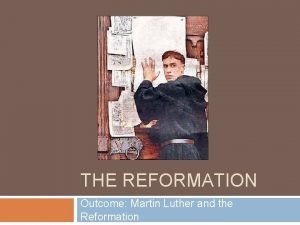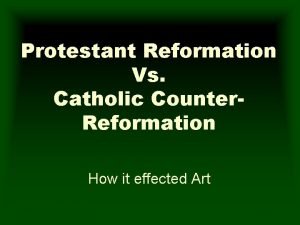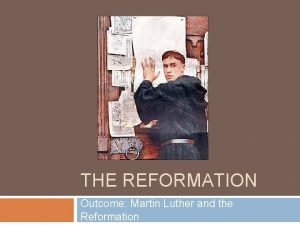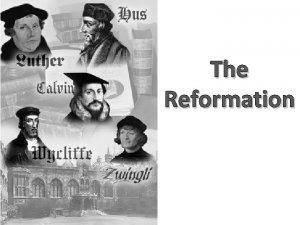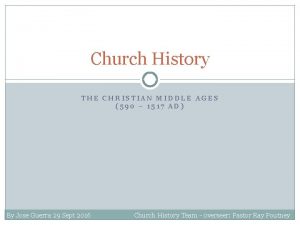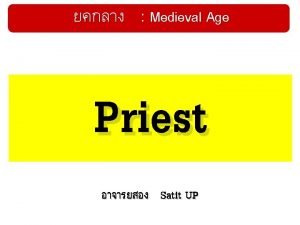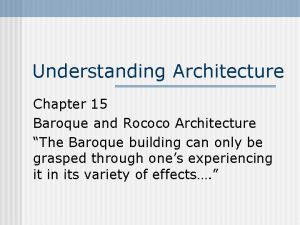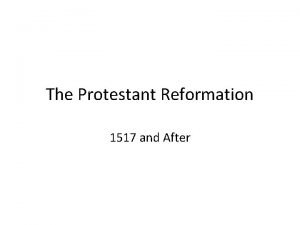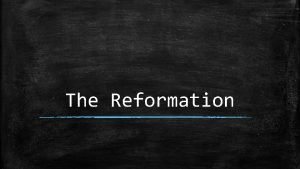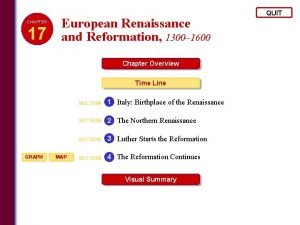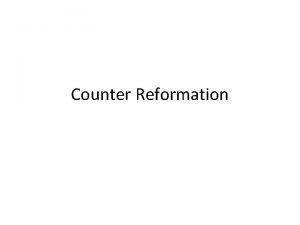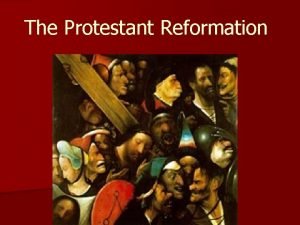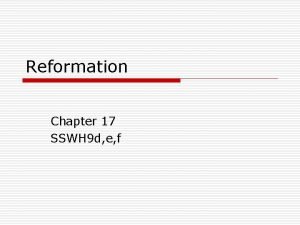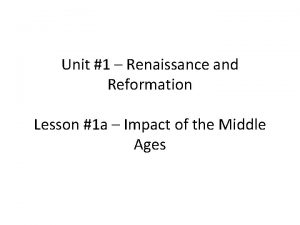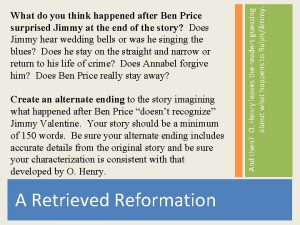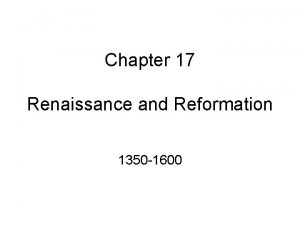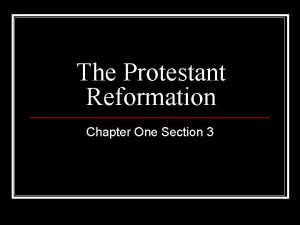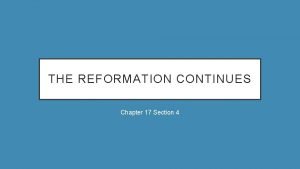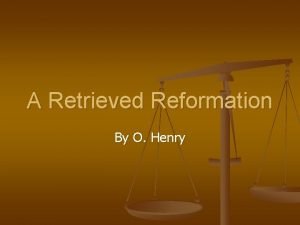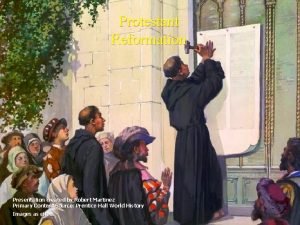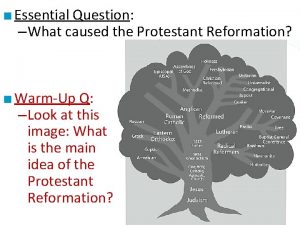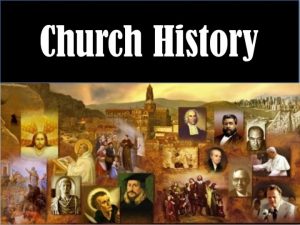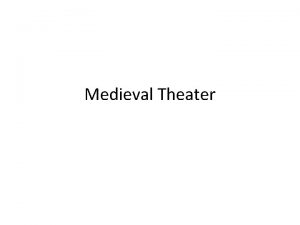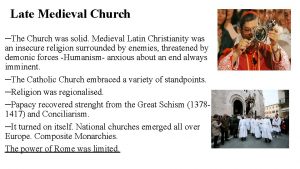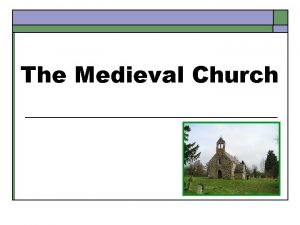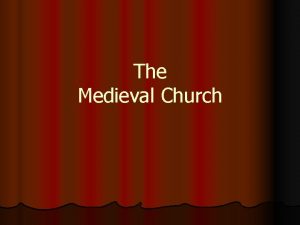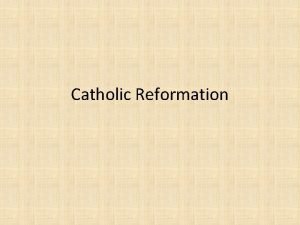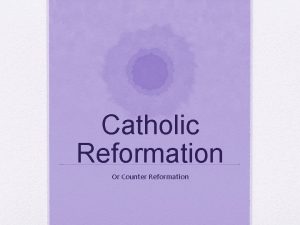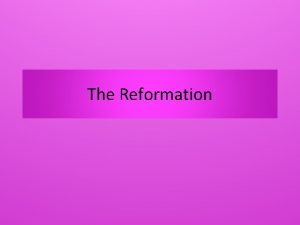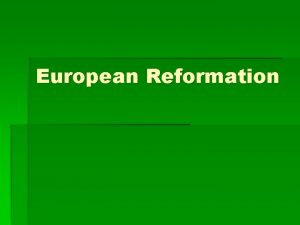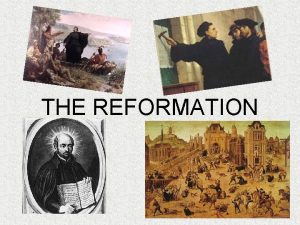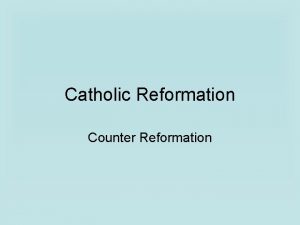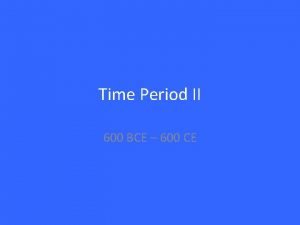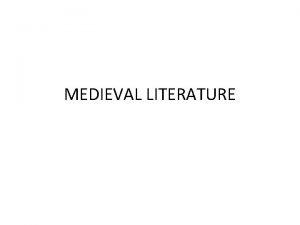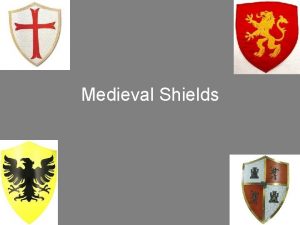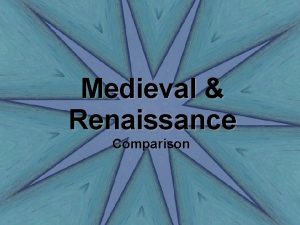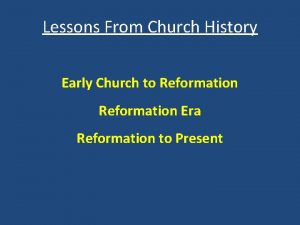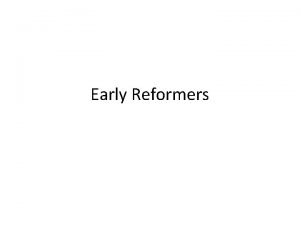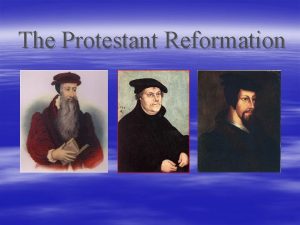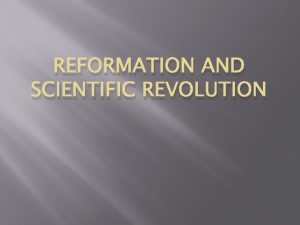Early Church AD 33 Medieval Church 600 Reformation

























- Slides: 25


Early Church AD 33 Medieval Church 600 Reformation Major Periods of Church History 1517 1648 Modern Church

The Early Church – De Re at su h, B rre u ct ria io l, a n of nd Ch ris t 33 First Century AD 1 Second Century 100 Imperially Sanctioned Church 31 3 32 - E 5 d 35 – T ict o 4 - he f M 43 C 0 ou ilan – n Au ci 41 gu l of 0 – st N Ro in ic e ae m of a e sa Hi ck pp ed o by Vi sig ot hs Persecuted Church Third Century 200 Fourth Century 300 Fifth Century 400 Sixth Century 500 600

The Medieval Church High Middle Ages Early Middle Ages Late Middle Ages 7 th 8 th 9 th 10 th 11 th 12 th 13 th 14 th 15 th Century Century Century 600 700 800 900 1000 1100 1200 1300 1400 1500

600 7 th Century 700 8 th Century 800 The Rise and Spread of Islam – The Spread and Corruption of the Church The Rise of the “Holy Roman Empire” 9 th Century 900 988 – Christianization of “Russia” 970 – Founding of Al-Azhar – Oldest Muslim University 901 – Corruption of the Papacy begins (Pornocracy) 831 – Early form of Transubstantiation Introduced by Radbertus 805 – 869 – Gottschalk – Medieval Calvinist 800 – Charlemagne crowned Holy Roman Emperor 732 – Battle of Tours – Charles Martel Halts Islamic Advance 731 – Venerable Bede's Ecclesiastical History published 726 – Beginning of the Iconoclast Controversy 716 – Boniface begins mission to the Germans 675 – 749 – John of Damascus 656 – Muslims divide into Shias and Sunnis 610 – Muhammad’s Vision – Rise of Islam 590 – 604 – Gregory the Great The Early Middle Ages 10 th Century 1000

1000 11 th Century 1100 12 th Century 1200 1285 – 1349 – William of Ockham 1274 – Thomas Aquinas writes the Summa Theologica 1256 – Establishment of the Augustinian Order 1184 – Waldensians excommunicated 1189 – 1192 – The Third Crusade 1198 – Innocent III becomes Pope 1202 -1204 – The Fourth Crusade 1209 – Albigensian Crusade 1220 – Dominic Guzman founded the Dominican Order 1227 – Beginning of the Inquisition 1182 – 1226 – Saint Francis of Assisi 1147 – 1149 – The Second Crusade 1151 – Peter Lombard writes the standard theological textbook 1155 – Bologna recognized as a university 1170 – Notre Dame becomes a university 1122 – Peter Abelard writes his well-known work Sic et non 1096 – 1099 – The First Crusade 1093 – Anselm becomes Archbishop of Canterbury 1073 – Hildebrand becomes Pope 1054 – The East West Schism High Middle Ages The Height of Papal Power – Physical Attacks on “Enemies” of the Church The Rise of Scholasticism and the University 13 th Century 1300

1300 14 th Century 1400 1497 – Savonarola excommunicated 1479 – Establishment of Spanish Inquisition 1453 – Constantinople falls; End of Eastern Roman Empire 1456 – Gutenberg produces first printed Bible 1431 – Joan of Arc burned at stake 1414 – Council of Constance 1415 – Jan Hus burned at stake 1418 – Thomas a' Kempis writes The Imitation of Christ 1378– 1417 – The Western Schism 1380 – Wycliffe supervises English Bible translation 1377 – Catherin of Sienna persuades Pope to return to Rome 1347– 1400 – The Black Plague 1337– 1453 – The Hundred Years War 1320 – Dante completed the Divine Comedy 1303 – John Duns Scotus teaches Immaculate Conception 1309– 1377 – The Babylonia Captivity of the Papacy Late Middle Ages The Weakening and Division of the Papacy – Wars and Plagues The Rise of Nationalism – Forerunners to the Reformation 15 th Century 1500

The Dawn of the Reformation http: //www. redlightdawn. com/

John Wycliffe Giving "The Poor Priests" His Translation of the Bible (William Frederick Yeames) https: //en. wikipedia. org/wiki/John_Wycliffe#/media/File: Wycliffe. Yeames. Lollards_01. jpg

John Wycliffe • During the Babylonia Captivity of the Papacy and the Western Schism, a new and potentially deadly challenge to the papacy arose in England. It came from a theologian at Oxford University by the name of John Wycliffe (1330 -84), a native of Yorkshire in northern England. • After studying theology at Oxford, where he achieved fame as a lecturer in theology and philosophy in the 1360 s, Wycliffe became a religious advisor to the court of the English king, Edward III (1327 -77). • Wycliffe had developed theological views which the English monarchy and nobility found useful in their conflict with the papacy; this conflict revolved around the papacy’s claim to own England, based on the fact that King John had surrendered England to Pope Innocent III in 1213. Needham, Nick. 2, 000 Years of Christ's Power Vol. 2: The Middle Ages

John Wycliffe • According to Wycliffe, all legitimate dominion comes from God. But such dominion is characterized by the example of Christ, who came to serve, not to be served. • Any lordship used for the profit of the ruler rather than for that of the governed is not true dominion, but usurpation. • The same is true of any dominion, no matter how legitimate, which seeks to expand its power beyond the limits of its authority. • Therefore, any supposed ecclesiastical authority that collects taxes for its own benefit, or seeks to extend its power beyond the sphere of spiritual matters, is illegitimate. • Naturally, these views were well received by civil authorities in England, involved as they were in a constant quarrel with the papacy precisely over the questions of taxation and of the temporal authority of popes. Gonzalez, Justo L. . The Story of Christianity: Volume 1: The Early Church to the Dawn of the Reformation (p. 412)

John Wycliffe • Such opinions got Wycliffe into trouble, and Bishop Courtney of London summoned Wycliffe to appear before his tribunal in London in February 1377 to answer for his views, but the protection of King Edward III’s younger son, John of Gaunt, prevented Courtney from harming Wycliffe. 1 • Three months later, Pope Gregory XI issued five bulls (church edicts) against Wycliffe, in which Wycliffe was accused on 18 counts and was called “the master of errors. ” 2 • At a subsequent hearing before the archbishop at Lambeth Palace, Wycliffe replied, “I am ready to defend my convictions even unto death…I have followed the Sacred Scriptures and the holy doctors. ” 2 • He went on to say that the pope and the church were second in authority to Scripture. 2 1 Needham, Nick. 2, 000 Years of Christ's Power Vol. 2: The Middle Ages 2 Galli, Mark. 131 Christians Everyone Should Know (p. 212). B&H Publishing Group.

John Wycliffe • When the Western Schism broke out on the death of Pope Gregory XI in March 1378, Wyclif’s theology began to become more radical. • He published a book called The Truth of Holy Scripture, in which he argued that the Bible was the only source of Christian doctrine, by which believers must test all the teachings of the Church, including the early Church fathers, the papacy and ecumenical Councils. • All Christians should read the Bible, so it must be translated from the Latin of the Vulgate into the native languages of the various nations. • Wyclif’s views here were quite revolutionary. • In the Middle Ages in Western Europe, people had come to regard the Bible as the clergy’s book; priests and theologians alone could interpret it correctly and teach laypeople what it meant. Needham, Nick. 2, 000 Years of Christ's Power Vol. 2: The Middle Ages

John Wycliffe • Wycliffe began translating the Bible into English, with the help of his good friend John Purvey. • The church bitterly opposed it: “By this translation, the Scriptures have become vulgar, and they are more available to lay, and even to women who can read, than they were to learned scholars, who have a high intelligence. So the pearl of the gospel is scattered and trodden underfoot by swine. ” • Wycliffe replied, “Englishmen learn Christ's law best in English. Moses heard God's law in his own tongue; so did Christ's apostles. ” • Wycliffe died before the translation was complete (and before authorities could convict him of heresy); his friend Purvey is considered responsible for the version of the “Wycliffe” Bible we have today. Galli, Mark. 131 Christians Everyone Should Know (pp. 212 -213).

John Wycliffe • Later in 1378, Wycliffe wrote another important book entitled On the Church. • In this book, Wycliffe defined the Church, not in terms of an outward organization controlled by papacy and priesthood, but as the whole body of the elect, those eternally predestined to salvation by the pure grace of God. • And if, from the viewpoint of eternity, the Church was the elect on earth at any given point in time, in other words, the entire company of true believers in every land. • The Church was thus a spiritual and invisible body, rooted in God’s eternal predestination, infallibly known to God alone, and its head was not the pope but Christ Himself. Needham, Nick. 2, 000 Years of Christ's Power Vol. 2: The Middle Ages

John Wycliffe • The pope, Wycliffe said, could be the head only of the outward and visible church that existed in the city of Rome, which was made up of both the elect and the non-elect. • In 1379, Wycliffe wrote The Power of the Pope. Here he argued that the papacy was of human not divine origin, and denied that the pope had any authority over any secular government. • Then in 1380 came his boldest stroke: he attacked the Catholic doctrine of holy communion in his On the Eucharist. • Wycliffe rejected transubstantiation and went back to the earlier views of Augustine and Ratramnus. Needham, Nick. 2, 000 Years of Christ's Power Vol. 2: The Middle Ages

John Wycliffe • The true view of the eucharist, Wycliffe argued, had vanished from the Western Church since the 11 th century, but was still preserved in the Eastern Orthodox Church. • This was not the only appeal Wycliffe made to the Eastern Church; he also held it up as an example in other matters, e. g. allowing the clergy to marry. • Thus John Wycliffe began the great tradition of Western reformers using the Eastern Church as a weapon with which to attack the corruptions of Rome. • It was a clever strategy. For in many disputed matters, if Rome claimed that it had the ancient practice of the Church on its side, a reformer could simply point to the Eastern Orthodox and say, “But they are as ancient as you, and they don’t do this or believe this!” Needham, Nick. 2, 000 Years of Christ's Power Vol. 2: The Middle Ages

John Wycliffe • By Catholic standards, Wyclif’s denial of transubstantiation had made him into a dangerous heretic, and the English court and nobility (including John of Gaunt) broke off their support for him. • Oxford University also turned against him, expelling his followers. • Wycliffe retired to Lutterworth in the English midlands, where he was the parish priest. • He spent the last three years of his life writing popular pamphlets, in which he set out his views vigorously and effectively in the English language, and several academic works in Latin in which he explained his views in a more scholarly way. Needham, Nick. 2, 000 Years of Christ's Power Vol. 2: The Middle Ages

John Wycliffe • Wycliffe sent out preachers to proclaim the Gospel, and provided sermons for them. • For Wycliffe, the essence of the ordained ministry was preaching the Word, rather than celebrating the sacraments; it was preaching that made unbelievers into true Christians, and it was preaching above all that built Christians up in the faith by helping them to understand what it meant. • Wycliffe died in 1384, and was buried in the Lutterworth church graveyard. • 34 years later the Church authorities dug up his body, burnt it for heresy, and threw its ashes into the river Swift. Needham, Nick. 2, 000 Years of Christ's Power Vol. 2: The Middle Ages

John Wycliffe • Protestants have hailed Wycliffe as “the morning star of the Reformation”. • Wyclif’s followers were called Wycliffites, or “Lollards” (a term of abuse which probably means “mumblers”). • The Lollards became the English equivalent of the Waldensians. • In 1395, a group of Lollard members of parliament published a manifesto called The Twelve Conclusions, which denounced the English Church’s bondage to the papacy, advocated the marriage of the clergy, and condemned transubstantiation, prayers for the dead, pilgrimages, and the holding of political office by bishops. Needham, Nick. 2, 000 Years of Christ's Power Vol. 2: The Middle Ages

John Wycliffe • Like the Waldensians, the Lollards became a secret underground sect. • They were found mainly in London and the surrounding areas in southern England; it was a family-based “heresy”, passed on from father to son. • Despite persecution, the Lollards survived until the Protestant Reformation, and in many ways helped to prepare the way for it by circulating Lollard tracts and the Bible in English. • When the Reformation came to England, the Lollards were its earliest supporters, and they soon merged into the mainstream of English Protestantism. Needham, Nick. 2, 000 Years of Christ's Power Vol. 2: The Middle Ages

John Huss https: //en. wikipedia. org/wiki/Jan_Hus#/media/File: Jan_Hus_2. jpg

https: //www. hopehelps. org/volunteer-appreciation-week-2018/

Class Discussion Time https: //www. weareteachers. com/moving-beyond-classroom-discussions/

*Class Discussion Time • Wycliffe argued that any lordship used for the profit of the ruler rather than for that of the governed is not true dominion, but usurpation and the same is true of any dominion, no matter how legitimate, which seeks to expand its power beyond the limits of its authority. • Christians in other ages have sometimes argued on the basis of Romans 13 and other passages that even abusive civil authority is ordained by God is to be obeyed. Did Wycliffe get it wrong? • In the Middle Ages in Western Europe, people had come to regard the Bible as the clergy’s book; priests and theologians alone could interpret it correctly and teach laypeople what it meant. • While modern Evangelicals might recoil from such an idea, do you think that, in effect, many Christians today do the same thing when they refrain from being good Bereans (Acts 17: 11) by failing to verify from the Scriptures whether the things they have been taught by their pastors and teachers are true or not? • Do you have a topic or question that you would like to see us to discuss?
 The reformation outcome: martin luther and the reformation
The reformation outcome: martin luther and the reformation Protestants vs catholic
Protestants vs catholic The reformation outcome martin luther and the reformation
The reformation outcome martin luther and the reformation Sudut istimewa
Sudut istimewa Protestant vs catholic war
Protestant vs catholic war Corruption in the church during the reformation
Corruption in the church during the reformation The medieval church (590-1517 ce)
The medieval church (590-1517 ce) Catholic church hierarchy
Catholic church hierarchy Early cpr and early defibrillation can: *
Early cpr and early defibrillation can: * What was the counter-reformation?
What was the counter-reformation? Protestant reformation map
Protestant reformation map Protestant reformation kahoot
Protestant reformation kahoot Protest reformation 1517 1648
Protest reformation 1517 1648 European renaissance and reformation chapter 17
European renaissance and reformation chapter 17 Objective of reformation movement
Objective of reformation movement The protestant reformation crossword puzzle
The protestant reformation crossword puzzle Reformation def
Reformation def Unit 4 lesson 1 the renaissance
Unit 4 lesson 1 the renaissance Create an alternative ending of the story
Create an alternative ending of the story Chapter 17 renaissance and reformation
Chapter 17 renaissance and reformation The renaissance and reformation section 3 quiz answer key
The renaissance and reformation section 3 quiz answer key Chapter 17 section 4 the reformation continues
Chapter 17 section 4 the reformation continues Retrieved reformation
Retrieved reformation Protestant reformation
Protestant reformation What caused the protestant reformation?
What caused the protestant reformation? Unit 3: martin luther & the protestant reformation
Unit 3: martin luther & the protestant reformation
